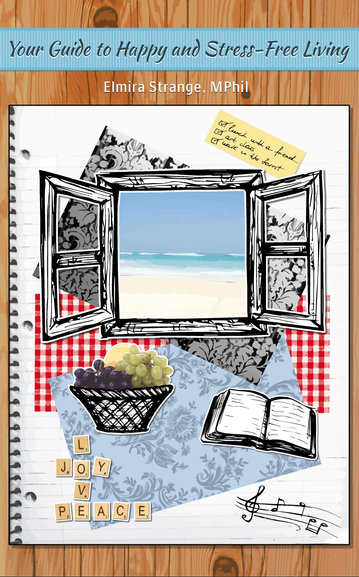Solve problems quickly and effectively. Turn worry into problem solving.
(from “The Relaxation & Stress Reduction Workbook”, see ref. below)
There are very few personal problems that cannot be solved through a suitable application of high explosives.
(A joke)
by Elia Strange

How to solve a problem.
This problem solving method is fantastic. It’s simple, straightforward, and gives you clear answers. I often use this method myself when I need ‘to think things through’, and I highly recommend to try this one out for yourself. You will need a pen and paper for this exercise.
1. Write down one situation that is currently worrying you. Be specific about what the problem is.
Example: I really want to start a business of my own, but my financial resources are very limited. I’m worried that I don’t know enough to avoid the pitfalls and I’ll end up losing everything.
2. Brainstorm for solutions. Make a list of possible things you can do to improve or correct the situation.
For example:
- Talk to other entrepreneurs about their experiences in starting their business.
- Research organisations that support entrepreneurial efforts and people.
- Research the possibility of acquiring a small business loan or other capital available for small start-up businesses.
- Join a couple of small-business and entrepreneural organisations.
- Find investors among friends and family.
- Start the business out of your home to save overheads and protect yourself financially.
- Work an extra job for a couple of years to earn more money.
- Stay at current job while starting your own company part-time.
3. Evaluate each idea:
Which ideas are not possible? Put an X next to those.
Which ones would be difficult to implement? Put a question mark next to those.
Which ideas could you implement right now? Put a Y next to those.
• Talk to other entrepreneurs about their experiences in starting their businesses. (Y)
• Research organisations that support entrepreneurial efforts and people.(X)
• Research the possibility of acquiring a small business loan or other capital available for small start-up business.(?)
• Join a couple of small-business and entrepreneurial organisations.(?)
• Find investors among friends and family.(?)
• Start the business out of your home to save overheads and protect yourself financially. (Y)
• Work an extra job for a couple of years to earn more money.(X)
• Stay at current job while starting my own company part-time.(Y)
4. Set specific dates. Make a contract with yourself to do all the things that you’ve marked with a Y.
For example: By April, 1, I will talk to other entrepreneurs about their experiences in starting their business.
By April, 15, I will research organisations that support entrepreneurial efforts and people.
By May, 1, I’ll have canvassed family and friends for possible investors.
By May, 15, I will research the possibility of acquiring a small-business loan or other capital available for small start-up businesses.
5. When you have completed all of the items marked with a Y, go on to the more difficult things marked with a question mark. Make a contract with yourself to do those.
For example: By June, 15, I will join a couple of small-business and entrepreneurial organisations.
By July, 1, I’ll decide whether I should clear out the back bedroom to create a home-based business office.
By July, 15, I will apply for all available capital that I find during my initial research
6. Now maybe some of the items marked with an X don’t look so hard. If there are any you think you could manage, make a contract with yourself to take that action.
For example: By August, 15, if other options have worked out, I will start my company part-time while continuing to work full-time at my current job.
_____________________________________________________________
I hope you like this logical approach. Sometimes it's the simple things (and planning) that makes all the difference.
At times, I would also use my own method:
- Write down all the things that you are not happy about
- Mark them all with 'how important they are'
- Write down what you can do about them (you might need to put them all into separate columns so that you could make the sense out of them eventually)
- See which are the most important ones (particularly to your peace of mind and happiness)
- See the easiest and the most suitable ways of solving them.
- Make a date for when each solution needs to be done (if you feel that you need to put a date on it).
_____________________________________________________________
Just by writing things down on a piece of paper that make you unhappy can make you think clearer about what you need to do to improve the situation.
With time, after you do this exercise many times on paper, you might be able to do it in your mind instead of writing it all down. Although many people, including myself, prefer to write things like that on paper.
When it is in front of you, it is much easier to see the solutions.
Other articles you might be interested in:
Stop your irrational thoughts in 6 simple steps
Fun tests and Quizzes
How to be more assertive
...or go to:
Archives of all Articles
Home Page
'How to solve a problem' Reference:
Davis, M., Eshelman, E.R., & McKay, M. (2008). The relaxation and stress reduction workbook. 6th ed. Oakland, CA: New Harbinger Publications, Inc.
Sign
up below to receive my free email newsletter with new fresh articles to
help you to become healthier and happier.
It's sent about once a month.
No spam. No
sharing of your email address. Easily unsubscribe at any time.
Best Articles:
10 tips to strengthen your marriage
Best ways to manage your stress
How to get what you want (the Law of Attraction)
Why do I need to eat healthy?
Signs and stages of stress
13 Facts about sugar addiction
7 Reasons for our unhappiness
Why people commit suicide
How to get a good night sleep
Try these Tests and Quizzes:
Is it time to take stress seriously?
How well do you know yourself?
Can you talk to teenagers?
Do you have a time to recreate?
Can you cope with stress well?
The Latest Articles:
Green Smoothie Recipe
Stress in Parents and Carers of disabled children (VIDEO)
Did you find your dream job yet?
Is an eye mask good for sleeping?
How to look and appear confident
Why am I tired all the time?
Exercise tips: 8 easy ideas for losing weight and become fitter
15 Sure signs that you are stressed
Are memory foam mattresses worth it?
How stress affects your health: What stress is doing to your body
How to get what you want (the Law of Attraction)
How to be more patient
How to deal with SAD: Autumn depression
How to stop negative thinking
How bad is your memory? (Fun Quiz)
What is love - in children words
How to make people like you?
Why do I forget things?
10 Tips to strengthen your marriage
Would you move abroad?
Are holidays worth it?



